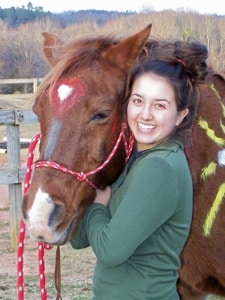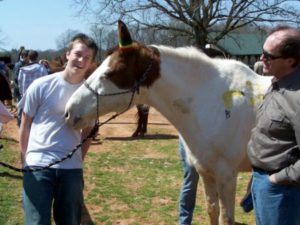
This can result in an otherwise good kid ending up in a cycle of bad friends, disciplinary challenges, low self-esteem, and harmful habits. These behaviors then cause the teen to become alienated from the people in their lives who love them and want them to succeed.
It’s a frustrating, painful cycle to watch – but there is hope. Through Equine Relationship Therapy, teens can become empowered with self-respect, critical life skills that set them up for success, a strong work ethic and other positive and lasting traits.
What is Equine Relationship Therapy?
Equine Relationship Therapy (ERT) – an exclusive take on Equine Assisted Psychotherapy (EAP) – is a therapeutic approach that utilizes relationships with horses to enhance behavioral, relational, emotional, and spiritual growth.
What makes Equine Relationship Therapy so effective? Caring for horses provides teens with a sense of responsibility and freedom. There is an unspoken bond between humans and horses. Teens sense this and want to strengthen that bond.
But building a relationship with a companion horse takes time, patience, and discipline.
Simply having another creature to care about, unselfishly, lets struggling teens shift focus from themselves and develop responsibility for something (or someone) else. As they change how they see themselves in relationship to others; positive behaviors begin to occur. Teens are also challenged to examine their own self-perception as they begin to build trust and relationship with their horse, to develop skills including:
- Developing a desire to act unselfishly as they feed, brush, and care for their companion horse
- Feeling relaxed and at peace as they ride their horse
- Experiencing a sense of accomplishment as they make progress in building a relationship with their companion horse
For these reasons, and more, equine therapy has long been used to give adolescents direction, purpose, and resilience against life’s challenges. In the case of teens who struggle to make good decisions and maintain positive relationships, equine therapy can be a godsend.
As far back as 600 B.C., equine therapy was used in ancient Greece to instill strong values in adolescents. Therapeutic Riding was introduced to the United States and Canada in 1960 with the formation of the Community Association of Riding of the Disabled (CARD). In the United States riding for the disabled developed as a form of recreation and as a means of motivation for education, as well as its therapeutic benefits.
At Shepherd’s Hill Academy, we continue this tradition as an important therapeutic component of our year-long residential program. Upon enrollment and based on their individual needs, your child has the privilege of choosing his or her own horse to bond with during a weekly Equine Relationship Therapy session.
Then, for the duration of their stay, your child participates in ERT activities facilitated by Equine Assisted Psychotherapy and Equine Assisted Learning O.K. Corral Series and Natural Lifemanship certified instructors and counselors.
What Are the Benefits of Equine Relationship Therapy?
Studies have indicated that equine therapy has been successful in helping students show marked improvements in the following areas:
- Problem Solving Skills like critical thinking, situational awareness, and discernment
- Leadership through self-regulation, integrity, patience, respect, and self-control
- Confidence, trustworthiness, planning ahead, and faith
- Setting healthy boundaries, anger management and stress tolerance, emotional awareness, and empathy
- Setting and Reaching Goals, personal and social responsibility, companionship and friendship, and self-sacrifice
…plus, many more. After learning safe and natural horsemanship, teens gain a sense of independence and the value of interpersonal relationships. It’s an experience that benefits every area of their lives.



